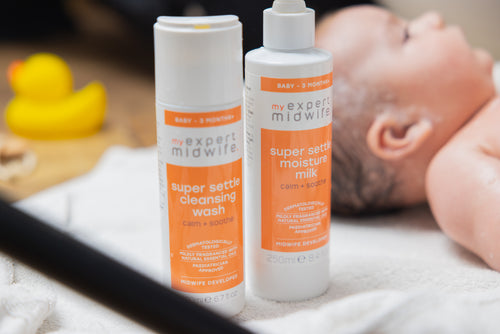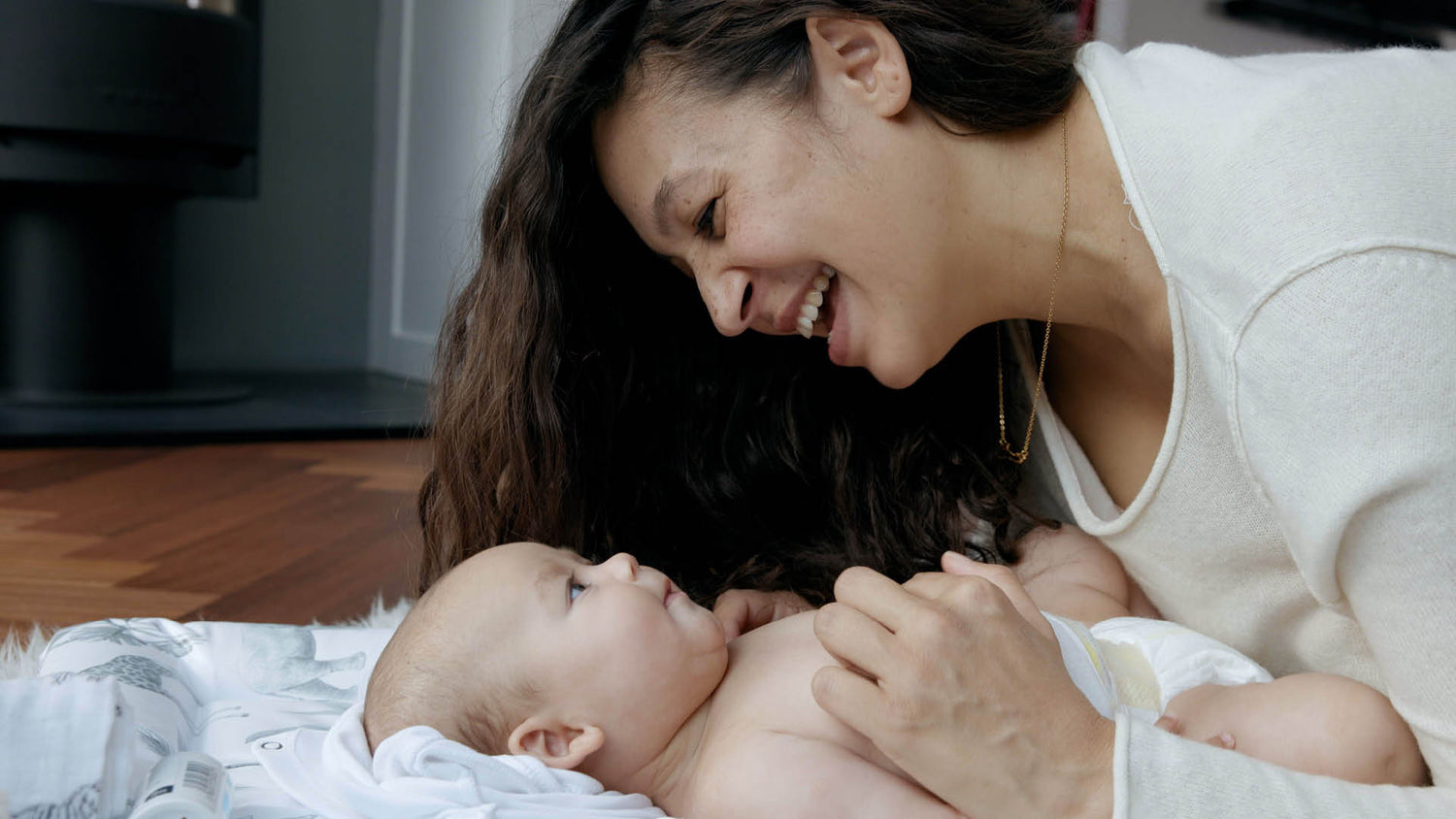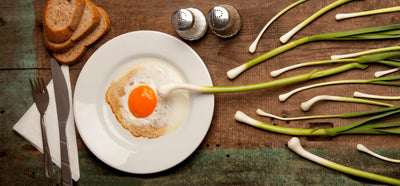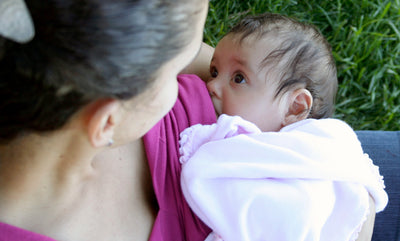‘What to eat when pregnant?’ - the million dollar question!
Learn more about what foods you should include as part of a healthy and nutritious pregnancy diet.
In this article, we will look at:
- Why your diet in pregnancy is important
- The essential nutrients you need as part of a healthy pregnancy diet
- The best foods for pregnancy
- Healthy snacks for pregnancy
- Can you eat eggs during pregnancy?
- Foods to avoid when pregnant
- What to eat during pregnancy if you are carrying twins
Why is it important to eat healthily during pregnancy?
A healthy pregnancy diet is important because the foods a woman eats directly influence her health, the health of her unborn baby, and the outcome of her pregnancy.
The evidence suggests a relationship between a mother’s nutrition in pregnancy and the occurrence of outcomes such as:
- Gestational diabetes
- Pregnancy hypertension (high blood pressure)
- Preterm birth
- Low birth weight
- Childhood asthma
Studies suggest women eating a healthy and nutrient-rich diet are significantly less likely to experience these.
Nutrition in pregnancy
Nutrition in pregnancy refers to how your and your baby’s bodies are nourished by the nutrients you take through food, and how these influence your and your baby’s health.
It is believed that it is the combined action of different nutrients in food, rather than single nutrients, that have the strongest influence on healthy pregnancy outcomes. This means that healthy eating during pregnancy should involve a varied range of nutrient-rich foods.
Some of the most important nutrients for pregnancy include:
- Protein
- Healthy fats
- Carbohydrates
- Fibre
- Iron
- Vitamin C
- Iodine
- Folate
- Vitamin D
- Calcium
- Vitamin B12
Here we dive into these nutrients, their benefits and how you can add them to your pregnancy diet.
1. Protein
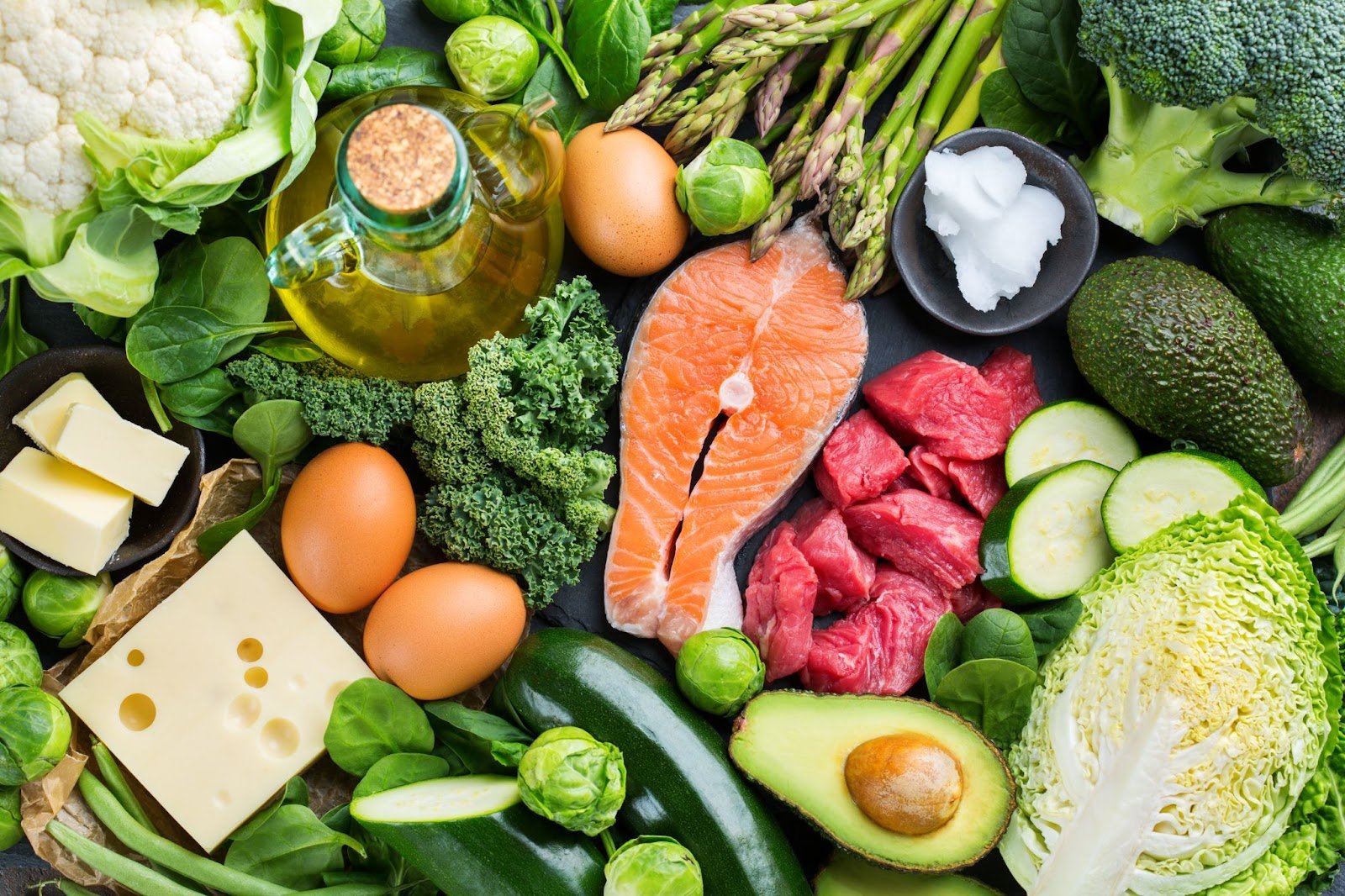
A healthy intake of protein is essential for your baby’s growth in pregnancy, as it is with protein that new muscles, organs and bones are built.
Protein can be obtained from animal meat and from plants. Poultry, fish, lean meat and eggs are good sources of animal protein, whereas vegetable protein is mostly found in beans and legumes, soy products, quinoa or in nuts and seeds and, in smaller quantities, in some vegetables.
Popular foods rich in vegetable protein include tofu and tempeh (made from soybeans), hummus (made with chickpeas), all dishes containing beans or legumes (stews, soups, veggie burgers), all nut butters, and salads, soups or curries prepared with or accompanied by grains like quinoa.
2. Healthy fats
Omega-3 fatty acids are healthy fats necessary for the optimal development of your baby’s brain and eyes. They are found in oily fish, such as mackerel, salmon, tuna, herring, and sardines, seaweed, chia seeds, hemp seeds, flaxseed and walnuts.
3. Carbohydrates
Carbohydrates provide energy and are an essential food for pregnancy. However, it is important to favour complex carbohydrates over simple carbohydrates.
Complex carbohydrates have a low glycaemic index (GI) and help prevent the peaks and troughs in blood sugar provoked by simple carbohydrates (such as white flour, sugary foods, white potatoes, etc.) and foods high in trans fats.
Low GI foods release energy slowly, maintaining your blood sugar and, therefore, your insulin levels steady and stable.
You may particularly crave starchy foods during your first trimester - to help stave off bloating, constipation and sudden drops in blood sugars, as well as help manage nausea, try to reach for complex carbohydrates.
Whole grains and wholemeal cereals, beans, legumes, some fruits and most non-starchy vegetables - and some starchy vegetables such as sweet potato - are examples of complex carbohydrates.
4. Fibre
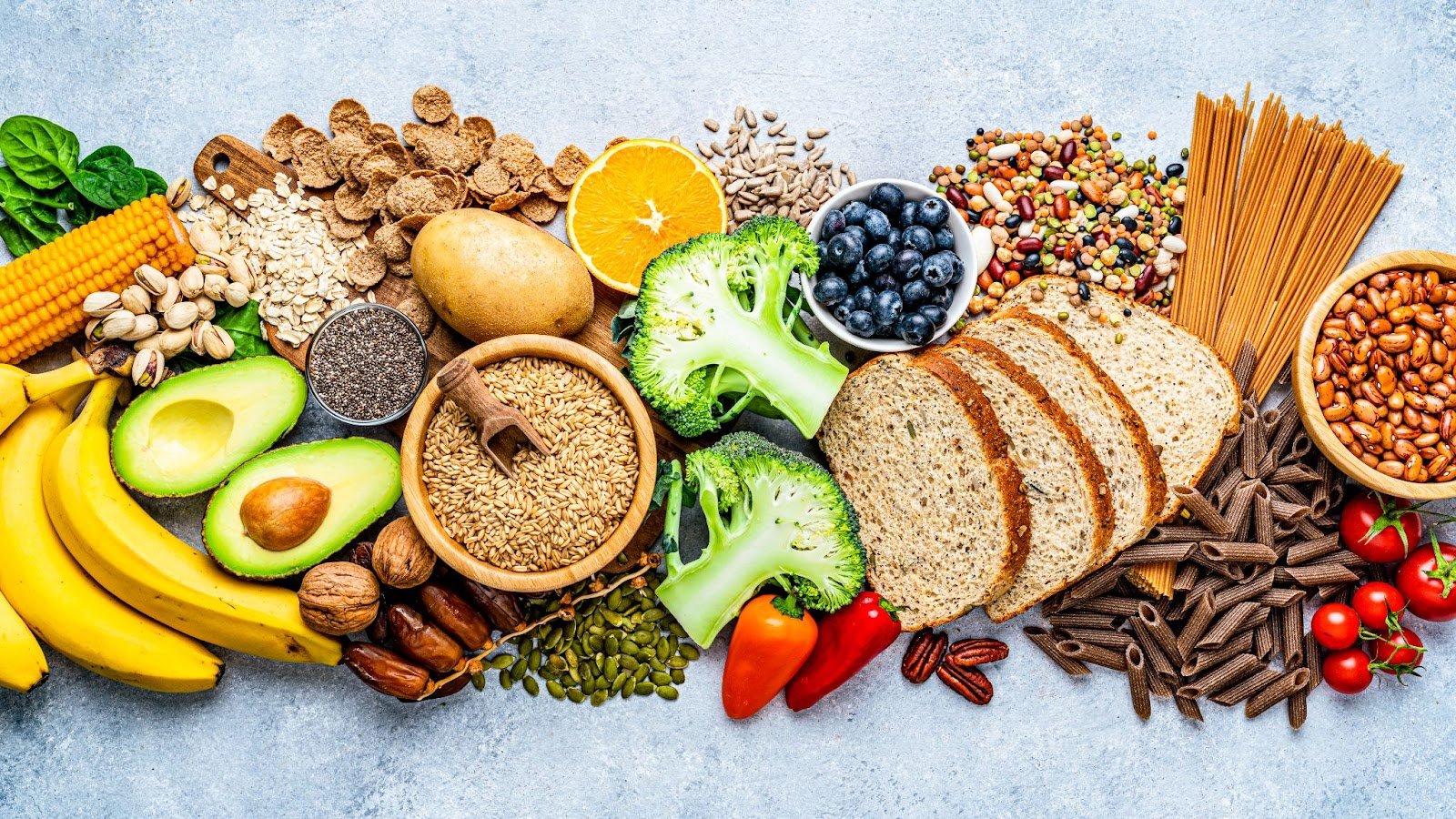
A well-functioning gut is essential when it comes to absorbing nutrients. And nothing guards off constipation better than fibre! For your bowels to work well, you need two types of fibre in your diet, soluble and insoluble.
Soluble fibre makes your bowel movements softer and easier to pass, whereas insoluble fibre provides ‘bulk’, which helps to keep your digestive system moving.
Oats, beans and pulses, barley, and soft fruits like pears, berries and citrus fruits are rich in soluble fibre.
You can find insoluble fibre in wholemeal foods and bran, brown rice, fruit and veg that can be eaten with their skin, nuts, beans and vegetables such as leafy greens and cauliflower.
5. Iron
The requirement for iron in pregnancy can double and, in some cases, triple. Iron is an essential mineral for a healthy pregnancy as, without it, the body cannot make haemoglobin, the molecule which binds to oxygen and transports it around your body.
Iron is responsible for healthy blood and tissue formation and for ensuring you have enough oxygen-carrying capacity in your bloodstream for you and your baby.
Iron from plant foods (called non-haem iron) is thought to be less absorbable than iron from meat (haem iron) so, if you eat little or no meat, you will need to pay special attention to your diet and would be best to top-up your iron levels with a pregnancy supplement.
You can obtain iron from lean red meat such as beef, lamb and pork, dried fruits (especially dried apricots), fish, poultry, beans, peas, lentils, dark green leafy vegetables such as spinach, kale and beets’ greens, nuts and seeds (pumpkin seeds in particular), and iron-fortified cereals and breads.
Note: Tea and coffee contain tannins which can reduce the amount of iron your body absorbs, therefore avoid drinking them with meals.
6. Vitamin C
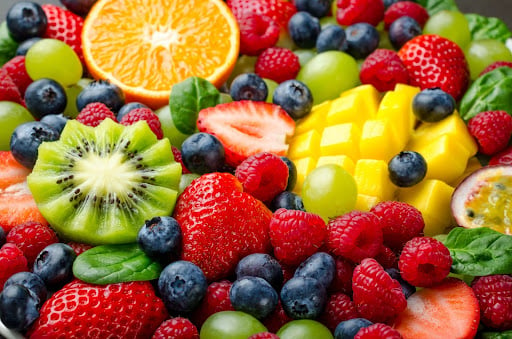
Is not only a great antioxidant and immune-system-booster, but it is necessary to help the body to absorb iron. Therefore, combining foods and drinks rich in vitamin C with foods that are rich in iron (particularly if it is non-haem iron) is advisable.
Rich sources of Vitamin C include oranges, orange juice, kiwis, strawberries and red peppers.
7. Iodine
Iodine plays an important role in the development of your baby’s brain and nervous system and is key for the healthy functioning of the thyroid.
Women in the UK are thought to be deficient in iodine and, seeing as iodine requirements increase during pregnancy, it is very important to incorporate foods rich in iron into the diet.
These include: white fish (haddock and cod are the richest in iodine), cow’s milk and dairy foods, eggs, iodine-fortified plant milks (check the label, as many are not fortified), and scampi (not necessarily breaded!).
A note on seaweed: although you may intuitively think of seaweed as a good source of iodine, the British Dietetic Association warns us that some seaweed contains excessive iodine (which carries its own health risks). Whereas other types contain very variable amounts, making seaweed, in general, an unreliable source of iodine.
8. Folate
Folate is an essential B vitamin found in dark leafy greens such as broccoli, kale and Brussel sprouts, as well as in asparagus, legumes, beets, citrus fruits, nuts, and some fortified grains.
Folate supports the development of the brain, spine and neural tube in your unborn baby. Folate is also beneficial beyond 12 weeks as it contributes to maternal tissue growth during pregnancy.
To ensure an adequate level of folate in your system, it is recommended that you take a good quality supplement, such as our pre-conception + pregnancy supplement, from 3 months before conception, or as soon as you know you are pregnant.
9. Vitamin D
Vitamin D is essential for pregnancy, as it helps calcium to be absorbed into bones, teeth and muscles, building your baby’s skeleton and protecting muscle strength. It is also instrumental for your emotional health and your immune system.
We produce vitamin D in our bodies from exposure to sunlight (weather and lifestyle permitting), but it can also be obtained from foods such as oily fish such as sardines, tuna, salmon and trout, egg yolk, some mushrooms, cod liver oil, fortified dairy and plant milks, cheese and poultry.
To safeguard your and your baby’s wellbeing, the NHS recommends you take a supplement containing 10mcg of vitamin D daily through pregnancy.
10. Calcium
The development and maintenance of good, strong bones and teeth in yourself and your baby requires adequate levels of calcium. But calcium is also important for cardiovascular health and for the functioning of muscles and the nervous system, so an adequate intake is essential for overall health and wellbeing.
By far the richest foods in calcium are malted milk, sardines, and soya bean curd or tofu that has been set with calcium chloride (E509) or calcium sulphate (E516), not nigari.
After that, other calcium-rich foods include: cheese (preferably hard, such as cheddar and fortified coconut cheese), yoghurt (dairy and fortified plant-based yoghurts), milk (sheep’s, cow’s and goat’s), calcium-fortified plant milks, kale, calcium-fortified cereals and breads, pilchards and tinned salmon (both with bones).
11. Vitamin B12
Thought to be as essential as folate (folic acid) for the development of your baby’s brain and neural tube, vitamin B12 also plays a vital role in the formation of healthy red blood cells, in making DNA and in the maintenance of a healthy nervous system.
A deficiency in this vitamin can lead to anaemia, so it is important to take enough through your diet.
Good sources of vitamin B12 that are also safe in pregnancy include oily fish such as mackerel, Atlantic herring, canned sardines, trout and salmon, meat such as steak, beef in different forms and lamb shank, fortified breakfast cereals, fortified plant milks (coconut, almond, soy, rice), semi-skimmed milk and low-fat yoghurt, and eggs.
You can support your nutritional needs by taking a daily supplement such as our pre-conception + pregnancy supplement women. Developed by experts and backed by research, our supplements contain only the right amounts of a few key nutrients to safeguard your nutrition from pre-conception, throughout pregnancy and into the postnatal period.
Best Foods to Eat During Pregnancy
Certain foods are packed with nutritional value, and to help you get as much ‘goodness’ from your diet as possible, we have picked the best pregnancy foods for you.
1. Salmon
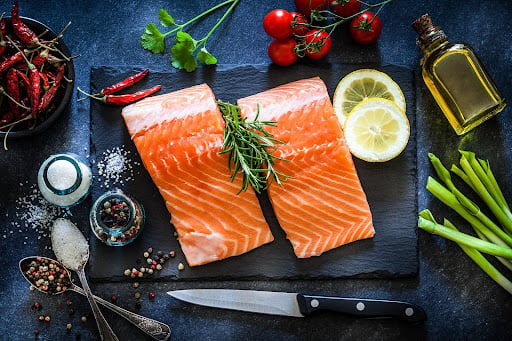
Salmon provides a real powerhouse of essential nutrients for all stages of pregnancy. The protein, vitamin D and calcium (in the tinned version with bones) in salmon build your baby’s muscles and bones, whilst the rich content of vitamin B12 and omega-3 fatty acids help develop your baby’s brain and nervous system.
Try to choose wild Atlantic salmon where possible or, alternatively, organic salmon.
Because of its rich flavour and consistency, salmon goes well with many plates:
- Mixed into scrambled eggs
- Combined with plenty of leaves and veg to make a filling salad
- Add to a pasta sauce
- Use in a fish pie
- Steamed, pan-fried, or oven-baked with a big side of steamed veg or salad
2. Dark leafy greens
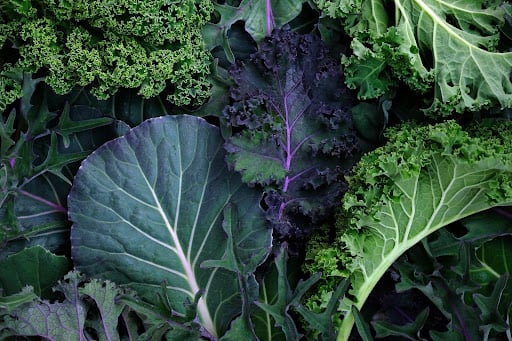
Dark leafy greens should be part of your daily diet from pre-conception, as they are rich in folate (the natural and more absorbable form of folic acid) and iron. Folate is essential for the healthy development of your baby’s brain and neural tube while iron is essential in the prevention of anaemia in pregnancy.
Their fibre content is vital to keep your bowels moving during pregnancy, and they are rich in calcium and vitamins C, K and beta-carotene, all vitamins which help support your immune system.
Good sources include kale, broccoli, spinach, mustard greens, bok choy, Swiss chard and watercress.
Get your daily portion by:
- Adding steamed greens as a side to your meals
- Preparing them in soups
- Mixing them into salads
- Blending them into smoothies
3. Nuts
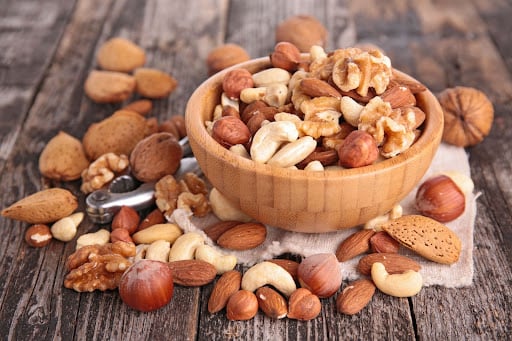
Nuts are an easy and versatile food that can be incorporated into most meals and serve as nutritious snacks. Due to their high protein and fibre content, they are ideal to have all throughout pregnancy.
They are good sources of micronutrients such as selenium, zinc, iron, potassium, as well as vitamin E and B vitamins.
Walnuts, in particular, are one of the highest plant sources of omega-3 fats - known to benefit your and your baby’s brain and heart health.
But that’s not all. Studies show that pregnant women who eat nuts or peanuts several times a week are much less likely to have children with a nut allergy. Furthermore, women who consume peanuts at least once a week have been shown to have a 20-25% decreased chance of their child being diagnosed with asthma at 18 months.
Including nuts in your diet is easy:
- Have peanut butter or other nut butters with toast or rice cakes, incorporate them into curries, salad dressings and smoothies, or mix them into porridge
- Add nuts to salads, curries, porridge and breakfast cereals
- Take a little tub of mixed nuts with you as a mess-free snack
4. Tofu
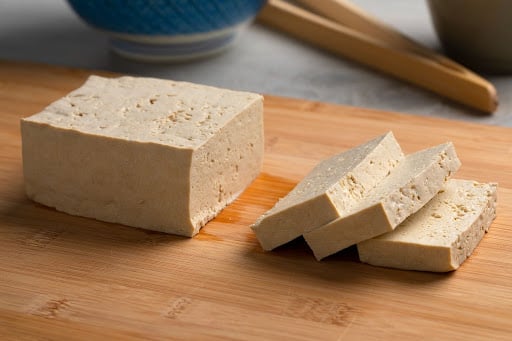
Tofu is another great food for pregnancy due to its high content in plant protein and healthy polyunsaturated fat. It is also high in iron (of the non-haem kind, so make sure you have some vitamin C foods with it) and, if it has been set in calcium chloride or calcium sulphate, it can also be a good source of calcium. The amount varies between types and brands, though, so read the label.
You can:
- Cook stir fries or grill firm tofu
- Make soups, dips and smoothies with silken tofu
- Prepare pies, rice dishes or salads with medium tofu
5. Fruits & vegetables
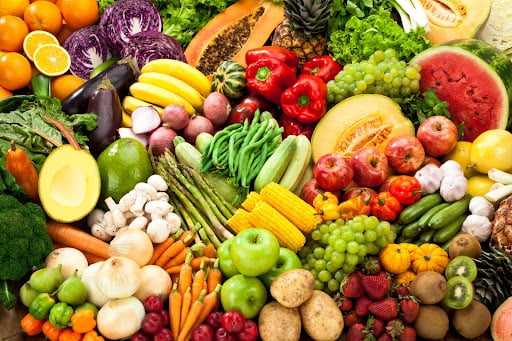
Fruit and vegetables need to be a staple of your diet during pregnancy. It is important to have variation and colour (red, yellow, green, orange, even purple!), so that you get as many vitamins and minerals as possible.
The vitamin C in peppers and citrus fruits, the iron and folate in dark leafy veg, the vitamin A in carrots and sweet potatoes, and the healthy fats in avocados will all contribute to your wellbeing and the healthy development of your unborn baby.
Some ideas for getting more fruit and vegetables into your pregnancy diet:
- Mix berries and fruit into your porridge, granola or smoothies
- Throw lots of colour into your salads
- Add vegetables to your frittatas and quiches
- Mix any and all left-over veg into a stir-fry
- And add half a plate of steamed veg to your meals
6. Greek Yoghurt
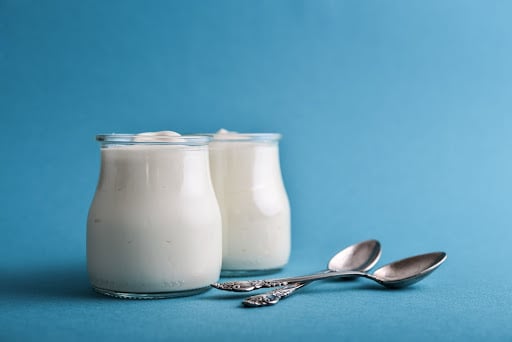
Greek yoghurt is a fantastic source of calcium, helping the formation of your baby’s bones and improving the health of yours. It also contains double the amount of protein than regular yoghurt and is rich in probiotics, which support your gut health.
As with any dairy products, always favour organic and, if possible, from grass-fed cows.
In the case of non-dairy Greek yoghurts, you will need to read the ingredient list very carefully, as the nutritional value can vary greatly between brands. Choose one that is high in protein (usually those made from almond and cashew milks), low in sugar and, ideally, with a short ingredient list. Also, look for their calcium content.
Here are some ideas for how to eat Greek yoghurt:
- As part of your breakfast - mixed with cereals, nuts, seeds, fruits and honey
- In herbed sauces with lamb, chicken or cauliflower steaks
- Mixed in with smoothies
7. Lean meat & poultry
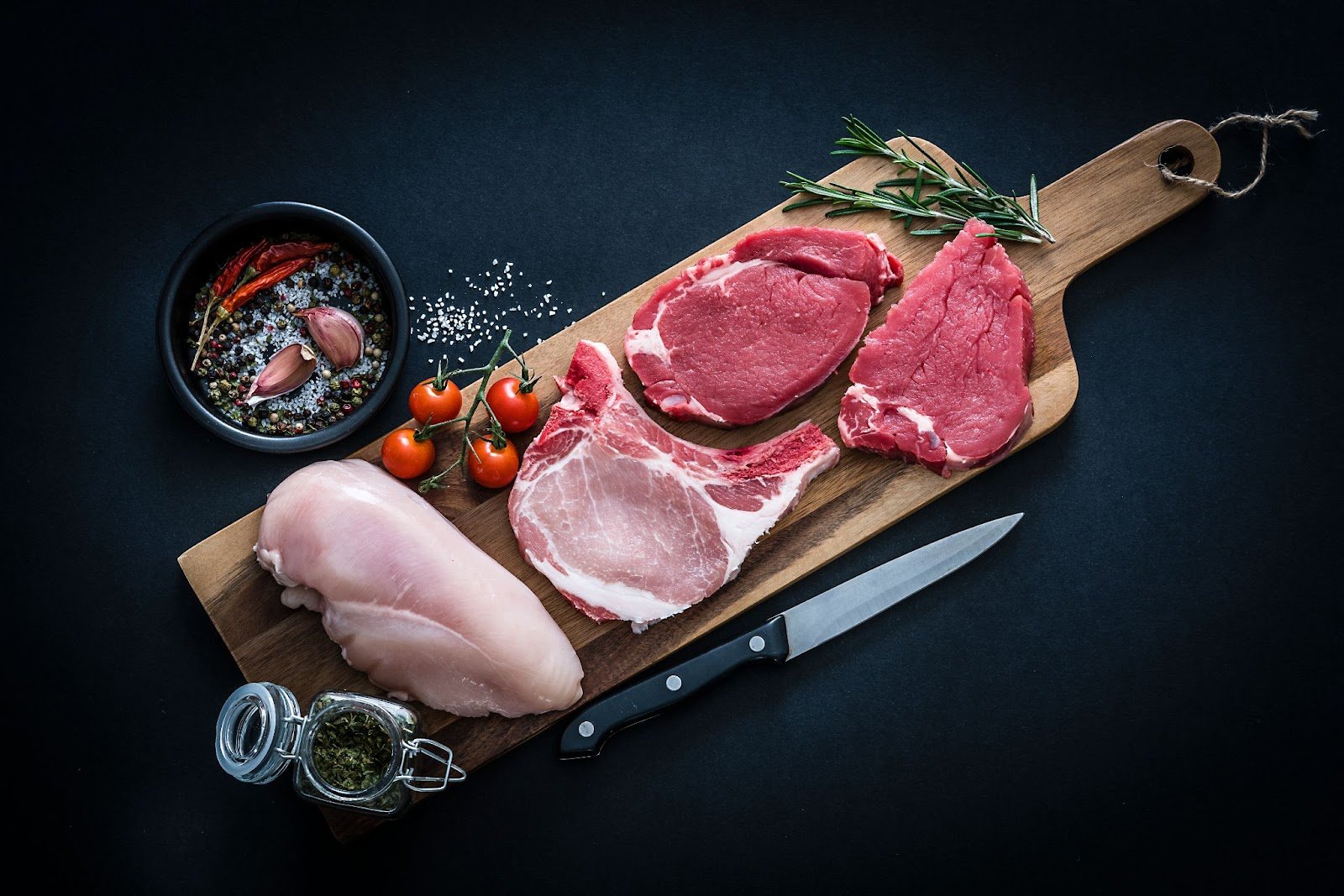
Lean meat and poultry are excellent sources of protein, iron and B vitamins, which are all essential for your wellbeing throughout pregnancy and for your baby’s growth.
Favour organic meats and, if possible, from grass-fed cattle and free-range chickens.
Although nice, a steak dinner is not your only option. You can:
- Prepare sandwiches with leftover meats and chicken or turkey
- Cook comforting stews or exotic curries
- Have a Mexican night, with fajitas or chile con carne
- Prepare a large lasagna dish to feed you for a couple of days
- Throw some beef strips or chicken goujons into a salad
8. Dried fruits
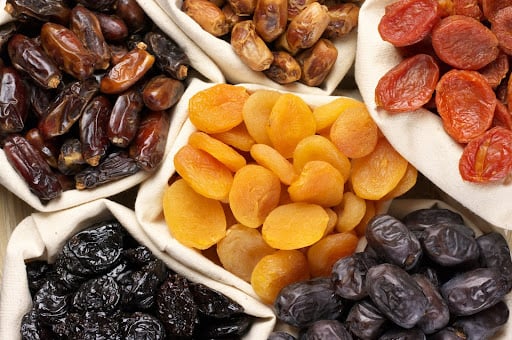
Dried fruits are packed-full of nutrition and are an easy snack to carry with you. Apricots are surprisingly rich in iron, prunes are famous for their fibre content, raisins are instant energy-boosters and dates are not only also rich in fibre but help to keep your blood sugars stable.
Here are some ways to get more dried fruit into your diet:
- Add prunes or dried apricots to your breakfast bowl
- Throw dates or raisins into a smoothie
- Mix your favourite dried fruits with your salad
- Experiment with recipes using apricots, sultanas and dates, such as tagines
- Carry a handful of mixed dried fruit in your bag as a snack
9. Pulses and legumes
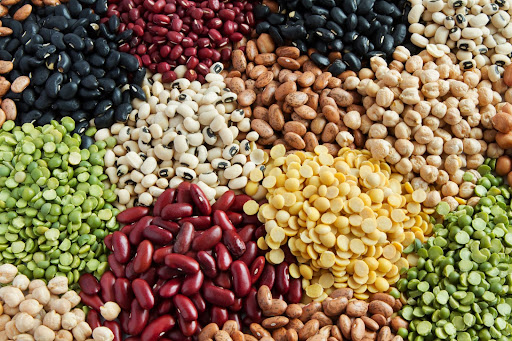
Beans, peas and lentils are excellent sources of protein and fibre and an ideal food for pregnant women through the three trimesters.
They contain an array of micronutrients, including iron, folate, phosphorus, zinc and magnesium, all of which contribute to your and your baby’s health and wellbeing.
Pulses can be bought dried or tinned and their versatility means you can eat them in many different ways, such as:
- In patties for veggie burgers
- In soups, stews and curries
- Cold in salads or dips
- In a chilli, pasta sauce or vegetarian lasagna
10. Avocados
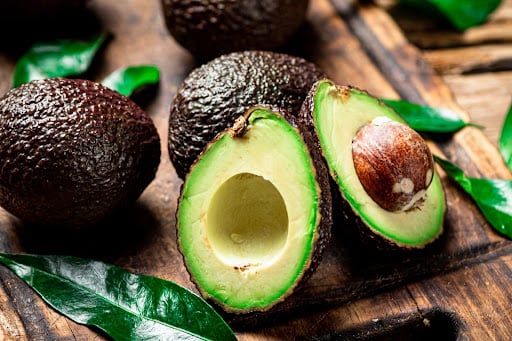
Avocados are rich in healthy fats, which are not only needed for your baby’s healthy development, but also help your body to absorb fat-soluble nutrients such as vitamin A, D, E and K.
Their fibre content is a god-send for preventing and managing constipation in pregnancy. They also contain folate and are a rich source of vitamin B6, known to help manage nausea, as well as also contributing to your baby’s brain development. For this reason alone, they are one of the best foods for early pregnancy.
Here are a few ways to prepare avocados:
- Have them for breakfast, lunch or dinner by mashing up the flesh and spreading it onto some sourdough bread with mayo and a sprinkling of seeds
- Slice them up and mix into salads
- Make some guacamole!
11. Eggs
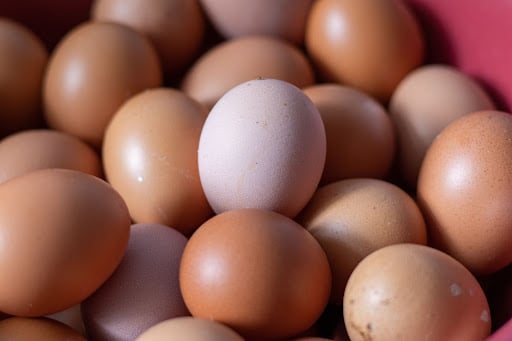
Your protein requirements increase as your pregnancy progresses. So, if eggs form part of your diet, make sure to eat several throughout your week.
As well as protein, eggs provide you with vitamin D - important for absorbing calcium into your and your baby’s bones - and vitamins B2, B5 and B12. Choline, a nutrient which supports memory and mood, is also present in eggs.
Don’t worry if you struggle to eat eggs in your first trimester, you will reap most of their benefits during your second and third trimesters.
Here are some ideas on how to include eggs into your diet:
- Have them for breakfast - poached, scrambled or, for a naughty treat, fried in a little oil
- Make omelettes, frittatas and Spanish tortilla
- Add hard-boiled eggs to salads, or have one on its own as a snack
- Prepare an egg sarnie for a filling lunch
Please note:To be safe from salmonella in pregnancy, avoid eating raw eggs and, ideally, choose eggs that have the Red Lion stamp. If you are eating out or do not know where the eggs are from, make sure both the yolk and the white are thoroughly cooked through.
Please note:To be safe from salmonella in pregnancy, avoid eating raw eggs and, ideally, choose eggs that have the Red Lion stamp. If you are eating out or do not know where the eggs are from, make sure both the yolk and the white are thoroughly cooked through.
Healthy Snacks for Pregnancy
There are times throughout your pregnancy when you may not feel like eating big meals, or when you may feel hungry often (and, sometimes, out of nowhere!). This is why healthy snacking in pregnancy is important.
You can make it as fun or as predictable as you want. Just make sure the foods you choose are nutritious and filling.
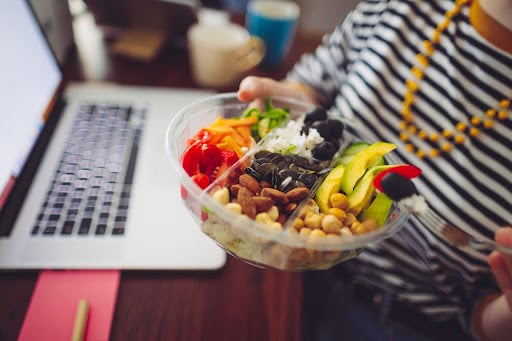
Here are some nutritious and healthy ideal pregnancy snacks:
- A Monkey plate - this involves putting a handful of different foods in a plate from which you can graze whilst you are working or pottering about in the house. Include things like nuts, dried fruits, chopped fruit, veggie sticks, cheese cut in cubes, or some shredded chicken (although any meat should be eaten soon). You will then be able to pick and choose bits of food that take your fancy.
- Dates - pack in a lot of fibre and are amazing at helping to keep your blood sugars stable. They are also delicious and can be filled with your choice of nut butter, to make them even more nutritious. Research shows that if you eat 6 dates per day from 36 weeks, you are more likely to have a shorter labour and less likely to need induction or end up with a C-section!
- Hummus with crudites - this traditional snack will provide you with protein, fibre, vitamins and flavour. Experiment making hummus with different beans and peas, and add colour with different veggies.
- Leftover frittata - dice it and put it in a tupperware for a satisfying snack on the go. The eggs, veggies and anything else you decided to throw into it the night before means you’ll be getting a good mix of protein, fibre, vitamins and minerals.
- Guacamole with tortilla chips - is a great, flavoursome snack, rich in healthy fats, protein, fibre and micronutrients.
- Greek yoghurt with berries and granola - fresh and creamy, with a crunch and the sweetness of berries, this healthy snack packs a punch of nutrients, including calcium, protein, vitamin C and fibre, to name but a few.
Can You Eat Eggs When Pregnant?
Yes, you can! Eggs are safe to eat when pregnant. And, because of their nutritional value, they are considered a very healthy food for pregnancy.
Just make sure you choose eggs that have the Red Lion stamp and avoid eating raw eggs. If you do not know where the eggs are from (for example, if you are eating out), only eat eggs where both the egg white and the yolk are cooked through. This will significantly reduce your risk of getting salmonella.
Foods to Avoid When Pregnant
There are some foods that are considered ‘risky’ during pregnancy because they may be more likely to carry harmful bacteria, viruses, heavy metals and toxins, or even have naturally excessive quantities of certain micronutrients.
To safeguard your wellbeing and your baby’s healthy development, the advice is to avoid or limit these foods:
1. Certain cheeses
Due to the risk of listeria, pregnant women are advised to avoid cheeses made from unpasteurised milk and, unless these are cooked until they are steaming hot, all mould-ripened soft cheeses (such as Brie, Camembert and chèvre) and soft blue cheeses (such as Roquefort, Gorgonzola or Danish blue). In the UK, the food label should tell you if a cheese has been made with unpasteurised milk.
2. Cold meats
It is best to avoid cold cured meats such as salami, prosciutto ham, chorizo and pepperoni as these may contain toxoplasmosis. Although rare, if eaten during pregnancy this bacteria can affect a baby’s development. Well-cooked cold, pre-packed meats such as ham, beef, chicken and turkey are safe.
3. Pâté and haggis
Both pâté and haggis can contain liver and this is advised against during pregnancy as it has a high vitamin A content, which may affect your baby’s development in pregnancy. Also, pâtés - whether they are meat or plant-based - have also been known to contain listeria, a bacteria which can harm your baby.
4. Eggs without the Lion Code
Unless they are completely cooked through, eggs without the Red Lion stamp could contain a bacteria called salmonella. Although salmonella will rarely cause harm to your developing baby, it can cause you severe vomiting and diarrhoea. So avoid foods containing raw or undercooked eggs, such as tiramisu, mousse or homemade mayonnaise.
5. Certain fish and raw shellfish
Due to their high content in mercury, make sure to stay away from swordfish, marlin and shark during pregnancy. Also, to avoid infections such as listeria or food poisoning, avoid smoked fish and raw shellfish.
6. Limit oily fish and tuna
Tuna has a higher mercury content than other fish, so it is best to not eat more than 2 tuna steaks per week, or 4 medium-sized tins per week. In the case of oily fish, they can contain more toxins and pollutants than other fish, so it is important to limit your consumption.
How to Eat When You’re Pregnant with Twins
Unfortunately, there is currently little data in relation to how the nutritional requirements in a twin pregnancy would be different to a singleton pregnancy. What experts have so far agreed on is that women carrying twins are likely to need to increase their energy intake.
This does not mean eating for 2 - or 3! Rather, it means listening to your body and eating nutrient-rich foods when you are peckish, or hungry.
You are more likely to be anaemic if you are pregnant with twins, which is why it is important to include foods rich in iron, folate and B12 every day, and to have these with other foods or drinks containing vitamin C (which helps absorb iron). Also, remember to stay away from caffeine around meal times, as tannins can inhibit iron absorption.
Get all of the nutrients you need during pregnancy
Eating well in pregnancy means having a well-balanced diet of foods that provide you with all the essential vitamins, minerals and macronutrients in optimal quantities.
You can also support your nutritional needs by taking a daily supplement such as our pre-conception + pregnancy supplement, which contains just the right amount of key nutrients to safeguard your nutrition from pre-conception through to the postnatal period.
